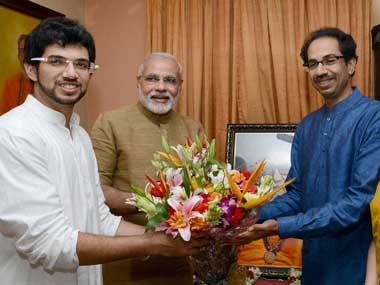Mumbai, Oct 25: After all the shadow-boxing and public posturing, the BJP appears to have succeeded in getting the Shiv Sena exactly where it wants it: as part of the Maharashtra government, but without undue clout.
 Soon after the assembly results made the BJP the single largest party with 122 seats — 22 short of the half-way mark — the Sena had started playing hard-to-get, but its game went awry when the Nationalist Congress Party (NCP) announced unilateral support for the BJP. This enabled the latter to announce that it will form the government, with or without the Sena.
Soon after the assembly results made the BJP the single largest party with 122 seats — 22 short of the half-way mark — the Sena had started playing hard-to-get, but its game went awry when the Nationalist Congress Party (NCP) announced unilateral support for the BJP. This enabled the latter to announce that it will form the government, with or without the Sena.
With a huge stake in the Brihanmumbai Municipal Corporation (where it is in alliance with the BJP), and at the Centre (where the Sena has a cabinet minister and expects more berths in the next reshuffle), the Sena saw the writing on the wall and decided that discretion is the better part of valour. It appears to have given up its old insistence of a 50:50 split of state ministries, and has accepted the reality that the BJP is now big brother.
The upshot: instead of a minority government, Maharashtra will now have a stable BJP-Sena coalition with 186 seats between them in a 288-member assembly. Add another 14-15 members from the smaller parties and independents, and the coalition could have nearly 200 members in its tally.
The final shape of the power-sharing arrangement and the coalition will be visible on Monday, when Union Home Minister Rajnath Singh and BJP general secretary JP Nadda arrive in Mumbai to kick off the process of government formation. They will hold consultations with the newly-elected legislators and elect Devendra Fadnavis, state BJP President, as leader of the legislature party.
Once this is done, Governor Vidyasagar Rao will invite Fadnavis to form the government. It appeared as if Nitin Gadkari, the Union Surface Transport and Rural Development Minister, had also thrown his hat in the ring when some Vidarbha MLAs lobbied for him as CM. But Gadkari said he was not keen to return to Maharashtra politics, which means the leadership issue is now settled in favour of Fadnavis. Both Fadnavis and Gadkari are from Vidarbha.
As part of the thaw in the Sena-BJP relationship, there are indications that all Shiv Sena MPs, 18 from the Lok Sabha and three from the Rajya Sabha, will attend a Diwali Milan dinner hosted by Prime Minister Narendra Modi for NDA MPs this Sunday (26 October). If all goes well, it would signal that ties between BJP and Sena have been mended, or at least have not broken down.
Sources told Firstpost that backroom talks over the last two days, held at various levels, helped Sena chief Uddhav Thackeray dilute his position on the Maharashtra power-sharing arrangement. He is now said to be inclined to accept the revised terms and conditions. The sources said that “he could not have been an equal partner in the Maharastra government but only an ally where mutual respect and coalition dharma is maintained by both sides.”
BJP sources said the party considers the Sena its “natural ally” and this means it should not unnecessarily criticise Prime Minister Narendra Modi or create tensions in the next state government. The BJP now expects greater circumspection in what the Sena mouthpiece, Saamna, writes. The current bout of pre-election tensions was triggered by negative write-ups in Saamna.
The BJP, by taking its time to offer an olive branch to the Sena, has forced the latter to take a more realistic view of the ground situation in the state. For its part, despite the bravado of setting up a minority government in Maharashtra, the BJP’s top leadership recognised that this can never result in stability. Hence the move make up with the Sena.
Despite claiming that it had not rejected the NCP’s offer of support, the party leadership was clear that taking this support would be politically too costly. The party was not so worried about what the NCP could demand in return, but was wary of the negative public perceptions it would have generated, especially for Modi, who called NCP a “naturally corrupt party” during the election campaign.
By the time Rajnath Singh lands in Mumbai on Monday, the alliance issue would, thus, in all likelihood have been clinched.





Comments
Add new comment